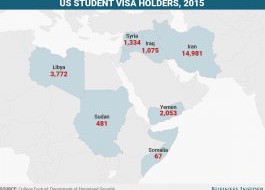 USC campus. Wikimedia Commons
USC campus. Wikimedia Commons
An “emergency fund” for University of Southern California students impacted by President Trump’s executive orders on immigration has nearly doubled in the past month.
Last month, the USC Graduate Student Government passed a resolution calling on their administration to denounce the EO by issuing a public statement, increasing funding for mental health centers that serve “marginalized” students, and most provocatively, establishing an “emergency fund” to cover travel and legal expenses for students affected by the executive order.
The resolution proposed an initial allocation of $11,000 for the emergency fund, specifying that the money would be drawn from the Campus Affairs budget with the concurrence of GSG Director of Campus Affairs Christopher Lo-Records.
Upon reviewing the budget, however, Lo-Records told Campus Reform that he realized there was an additional $9,000 left over, and promptly used it to supplement the emergency fund.
The new $20,000 allocation is “less than 1% of their [GSG’s] budget,” according to Lo-Records, who asserted that “this should probably be more than sufficient to fund students who need help.”
While the emergency fund is currently targeted at immigrant students, including illegal immigrants, Lo-Records said that in the future, he wants to open it up to “students facing other emergencies, including family difficulties, domestic violence, [and] being thrown out of their homes,” estimating that roughly 300 students fall into those categories at the graduate and undergraduate levels combined.
Lo-Records also pointed out that the emergency fund is not financed through tuition dollars, but rather from yearly fees set by the GSG, which is headed by elected student representatives on behalf of the student body.
GSG President Victoria Montrose told Campus Reform she fully supported the emergency fund initiative, calling it a necessary response to the Trump administration’s immigration policies.
“At a time when the current U.S. administration is targeting marginalized and vulnerable populations, we are doing everything in our power to support those populations,” she said. “We hope it will allow students to be reimbursed for any costs incurred to them by the first travel ban and to seek the legal help they need.”
According to The Daily Trojan, the Department of Homeland Security has identified 252 current USC students who are from countries affected by the executive order, and the school’s Office of Financial Aid reports there are at least 46 illegal immigrant students enrolled at the university.

In addition to establishing the emergency fund, the GSG resolution also calls for USC to increase support for marginalized students, especially those who hold “more than one marginalized identity,” and advocates hiring mental health professionals who “hold these marginalized identities.”
Andrea Avila, a USC graduate student who supports the emergency fund, told Campus Reform that making undocumented students feel safe is crucial.
“Being a student is very stressful” she told Campus Reform. “Imagine trying to do good in school while thinking that at any point you could be deported.”
The lingering fear of deportation, she said, “can have a tremendous impact in a student's academic performance, not to mention their mental health.”
The resolution also calls for USC to publically condemn President Trump’s latest executive order related to immigration—which has yet to happen since the resolution was initially published last month, though the order has since been halted by the courts.
Read the original article on Campus Reform. Copyright 2017. Follow Campus Reform on Twitter.




